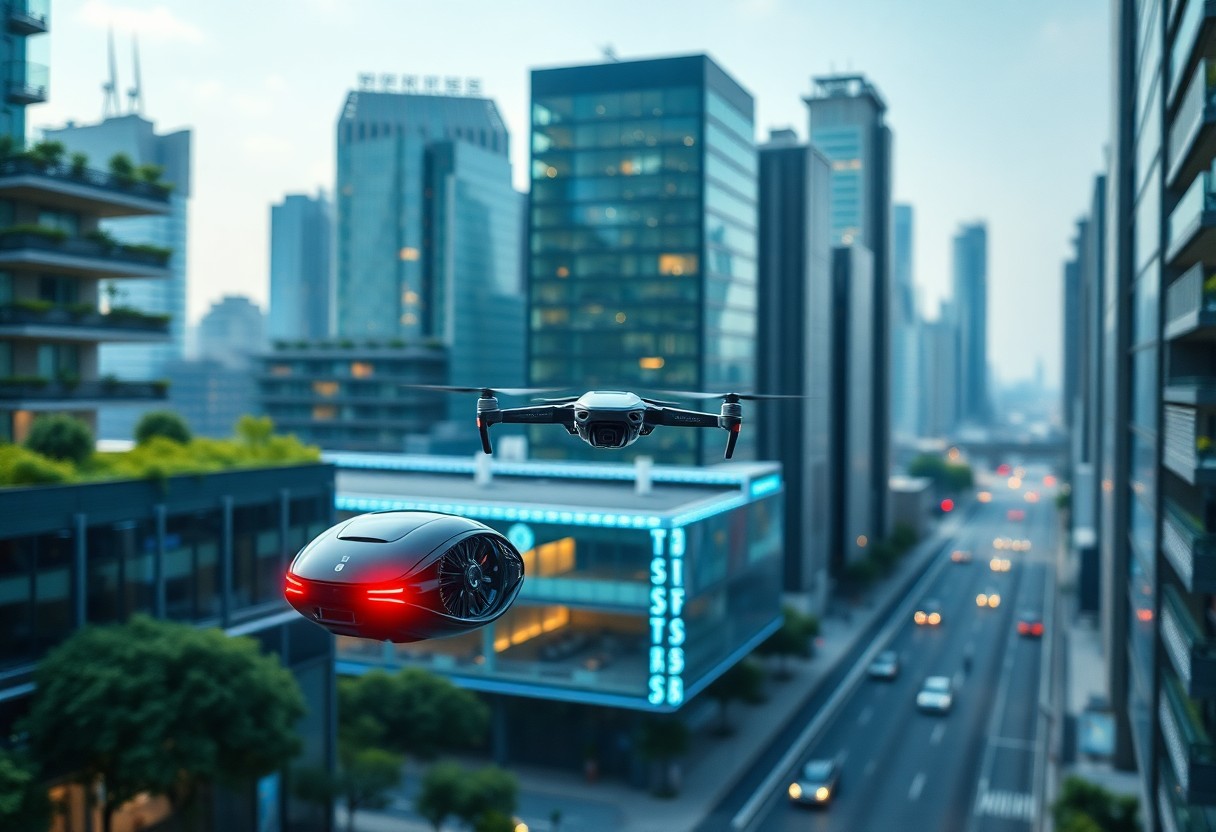Understanding Futuristic Technology – Key Innovations To Watch
The Ultimate Guide To Low-Calorie Ingredients For Cooking
April 2, 2025Transform Leftovers – Creative Low-Calorie Meal Ideas
April 3, 2025There’s a world of exciting innovations on the horizon that promise to reshape your daily life and the future of our society. As you explore the landscape of futuristic technology, it’s vital to be aware of the advancements that have the potential to bring about significant change, both positively and negatively. From artificial intelligence to quantum computing, this post will guide you through the key innovations worth your attention, ensuring you’re equipped to understand their implications in your world.
The Rise of Artificial Intelligence
Before the advent of artificial intelligence, technology evolved at a measured pace. However, AI has catalyzed a new era, revolutionizing industries, reshaping job markets, and enhancing personal experiences. As you engage with this transformative technology, you’ll discover AI’s immense potential to improve efficiency and innovation, making it a key cornerstone of future advancements.
Machine Learning Advancements
Below the surface of AI lies machine learning, a subset that enables systems to learn from data and improve over time. This area has seen rapid growth, with algorithms becoming more sophisticated and capable of processing vast amounts of information. As a result, you can expect smarter applications that better understand your preferences and needs.
AI in Everyday Life
Artificial intelligence is increasingly integrated into your daily routines, from virtual assistants to smart home devices. This technology analyzes your habits and preferences, making your interactions with devices more intuitive and personalized.
To put it simply, AI has woven itself into the fabric of your life, enhancing convenience and productivity. As you use your smartphone, for instance, personalized recommendations cater specifically to your tastes, whether in entertainment or shopping. While this brings about positive benefits, such as improved user experiences, it also raises concerns regarding privacy and data security. You must remain aware of how these technologies operate and the implications they hold, ensuring that your interactions with AI are both beneficial and safe.
The Impact of Quantum Computing
Any discussion about the future of technology would be incomplete without exploring the impact of quantum computing. This groundbreaking innovation has the potential to revolutionize the way we process information, tackle complex problems, and enhance your overall technological landscape. With its ability to perform calculations at unprecedented speeds, you may find quantum computing transforming industries from healthcare to cryptography.
Quantum vs. Classical Computing
Classical computing relies on bits that represent either a 0 or a 1, whereas quantum computing uses qubits, which can exist in multiple states simultaneously due to the principle of superposition. This allows quantum computers to handle complex calculations more efficiently than traditional systems, offering the promise of tackling tasks that are currently impossible within a reasonable time frame.
Potential Applications
By harnessing the power of quantum computing, you can anticipate advancements across various sectors, including optimization problems, drug discovery, and artificial intelligence. This technology not only accelerates data processing but also enhances accuracy and efficiency in simulations and predictive modeling.
In addition to these applications, quantum computing holds the potential to disrupt existing methodologies significantly. For example, in pharmaceutical research, it can expedite drug discovery by simulating molecular interactions at an unprecedented scale. In cybersecurity, quantum algorithms may provide solutions to vulnerabilities, though they also pose risks to current encryption methods. Lastly, in artificial intelligence, you could see improvements in machine learning models, allowing for more sophisticated data analysis that can lead to groundbreaking discoveries.

Breakthroughs in Biotechnology
Even as science progresses, breakthroughs in biotechnology are paving the way for revolutionary applications that promise to transform healthcare, agriculture, and environmental sustainability. These advancements are not just enhancing existing processes but are creating entirely new possibilities for how we interact with living organisms. You should stay informed about these innovations, as they have the potential to significantly improve the quality of your life and the environment around you.
Genetic Editing Techniques
An impressive leap in biotechnology is the development of genetic editing techniques like CRISPR. These tools allow you to modify the DNA of organisms with unparalleled precision, opening avenues to eliminate genetic disorders, enhance crop resilience, and tailor organisms for various environments. This powerful technology places the future of genetic research at your fingertips, enabling advancements that could change the landscape of biology as you know it.
Personalized Medicine
Any significant progress in biotechnology is the advent of personalized medicine, which tailors medical treatment to individual genetic profiles and lifestyle factors. This approach ensures that you receive therapies and drugs specifically designed for your unique biological makeup, leading to more effective and targeted healthcare solutions.
Plus, personalized medicine represents a paradigm shift in how diseases are treated. By integrating your genetic information, it can lead to better outcomes and fewer side effects compared to traditional one-size-fits-all approaches. However, it’s important to consider the ethical implications and potential risks, such as privacy concerns surrounding your genetic data. The integration of personalized medicine into mainstream healthcare not only promises a future where treatments are more effective but also raises questions about accessibility and inequality in healthcare delivery.
The Future of Renewable Energy
Unlike conventional energy sources, the future of renewable energy is brightening, with advancements paving the path to a more sustainable world. Innovations in solar, wind, and geothermal technologies are reshaping how you consume energy, making it cleaner and more efficient. To explore the latest trends that will impact this field, check out Technology Trends 2024 | Tech Vision.
Innovative Energy Sources
Before delving into energy storage, it’s vital to recognize the groundbreaking innovations in energy sources. Emerging technologies such as algae biofuels and advanced nuclear reactors are generating excitement, offering you alternatives that minimize environmental impact and enhance sustainability.
Energy Storage Solutions
Along with these sources, effective energy storage solutions are vital for ensuring that renewable energy is available when you need it. Technologies like advanced battery systems and pumped hydro storage help you manage energy supply and demand seamlessly.
Innovative energy storage solutions are transforming how you utilize renewable energy. The rise of solid-state batteries, with their potential for higher capacity and faster charging, is making electric vehicles more viable for everyday use. Additionally, grid-scale storage systems enable large amounts of energy to be stored from intermittent sources like solar and wind, ensuring that you have access to power even during periods of low production. Though challenges exist, such as production costs and raw material scarcity, the positive trends indicate a stronger, more resilient energy future.
The Development of Autonomous Vehicles
After years of research and innovation, the development of autonomous vehicles is at the forefront of technological advancement. These self-driving cars have the potential to transform transportation, enhance road safety, and reduce traffic congestion. You can expect significant improvements in the way we travel as automakers and tech companies collaborate to bring this vision to life.
Current Technologies
Current advancements in autonomous vehicles incorporate a blend of sensor technology, machine learning, and artificial intelligence. You will find that many modern self-driving vehicles utilize lidar, radar, and cameras to gather real-time data about their surroundings, enabling them to navigate safely and efficiently. As these technologies evolve, they promise to enhance the driving experience and offer greater convenience.
Regulatory Challenges
Besides technological hurdles, regulatory challenges pose significant obstacles to the widespread adoption of autonomous vehicles. You may be surprised to learn that varying laws, safety standards, and liability issues across different regions can complicate the implementation of these innovative machines on public roads.
Challenges in regulation often stem from the need to ensure public safety while fostering innovation. You might see that lawmakers are trying to keep pace with rapid advancements, which means that certain regulations can become outdated quickly. Furthermore, the question of liability in case of accidents involving autonomous vehicles can create complexities. Striking a balance between encouraging development and ensuring the safety of your community is a crucial aspect of the ongoing dialogue in this field. This regulatory landscape will play a defining role in shaping the future of autonomous vehicle adoption.
Integration of Augmented and Virtual Reality
Not only are augmented and virtual reality (AR and VR) reshaping entertainment, but they are also becoming integral tools across various sectors, enhancing the way you interact with your environment, perform tasks, and consume information. As these technologies evolve, you can expect more seamless integration into daily activities, thereby revolutionizing your experiences in work and play.
Transforming Industries
On the forefront of innovation, AR and VR are transforming industries such as healthcare, education, and manufacturing. You can leverage these technologies for immersive training environments, allowing you to practice skills in a safe yet realistic setting, ultimately enhancing your proficiency and confidence in real-world applications.
Social Implications
Along with their industrial benefits, AR and VR raise important social implications regarding privacy, mental health, and human interaction. As you engage more with these technologies, you may find the lines between digital and physical realities blurring, which can lead to isolation or a disconnect from genuine social experiences.
This integration poses both risks and rewards for society. On one hand, you might enjoy unparalleled experiences and connections through virtual platforms, fostering creativity and collaboration. On the other hand, the potential for addiction and a decline in face-to-face interactions could have negative repercussions on your mental well-being. Staying informed about these social challenges will empower you to navigate the digital landscape more effectively, ensuring that the benefits of technology enhance your life rather than detract from it.
To wrap up
With this in mind, understanding the key innovations in futuristic technology empowers you to stay ahead in a rapidly changing landscape. As you explore advancements like artificial intelligence, quantum computing, and biotechnology, consider how they can impact your life and the world around you. By keeping an eye on these developments, you can better adapt to emerging trends and shape your future accordingly. Embrace the opportunity to engage with these transformative technologies and enhance your understanding of the possibilities that lie ahead.
NEWSLETTER






